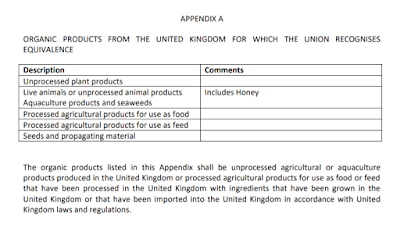I don't see any sign of the shellfish industry getting any change from the EU or even Brussels admitting it has made a mistake and is misinterpreting its own rules as Dr North claimed a while ago. What I did notice recently was an item on The Loadstar - a website dedicated to supply chain issues - which quoted Mrs Nicky Holmyard of Offshore Shellfish Ltd, a company I posted about recently. She and her husband had a £10million business until January 1st and are involved in a legal action against the government.
Mrs Holmyard told The Loadstar: “When we knew Brexit was going to happen, we knew we would be a third country and LBMs from Class B waters would be prohibited unless a deal was negotiated between the UK and the EU.
“The EU has never allowed LBMs from third country Class B waters to be depurated in the EU. Defra repeatedly told us they had an agreement on paper that would allow us to continue exporting mussels from Class B waters for depuration.
“Every time we asked for legal evidence to support the position, Defra was unable to provide it, and carried this line on beyond the end of the transition period.”
She claimed the industry (or her business anyway) knew the rules prevented them shipping LBMs from Class B waters and specifically asked DEFRA for advice who assured them it was all OK.
And despite Dr North claiming otherwise, the army of experts at DEFRA did not seem to be able to identify the loophole he thinks exists. Perhaps they should have asked him?
Anywat, yesterday, someone on Twitter posted an audio file of Shanker Singham on Radio 4's Farming Today sounding very relaxed and reassuring. The clip concerns Live bivalve molluscs (LBMs) and the presenter put it to him that third countries were never able to export unpurified LBMs to the EU (it's about 1:30 in but the whole thing is only 2 minutes and well worth listening to) and DEFRA had been wrongly advised.
It all sounds very vague to me. The EU say the rules haven't changed although they have issued a "clarification." Shell fishermen who risk going out of business may not be totally reassured by Singham. I wondrer if he can provide the legislative record? Don't hold your breath.
I had a quick look at the TCA and I do not see anywhere in the 1449 pages any reference to further negotiation on SPS equivalence so it isn't in the legally binding treaty text.
He may be referring to ANNEX TBT-4: ORGANIC PRODUCTS on page 532 which seems to show that 'organic' products from the UK are already accepted as equivalent. The text says, "With respect to products listed in Appendix A, the Union shall recognise the laws and regulations of the United Kingdom listed in Appendix C as equivalent to the Union's laws and regulations listed in Appendix D."
One is commission regulation (EC) No 1235/2008 of 8 December 2008 laying down detailed rules for implementation of Council Regulation (EC) No 834/2007 as regards the arrangements for imports of organic products from third countries.
This isn't the regulation preventing LBMs from Class B waters (that is 1251/2008) so I don't know. However, I would be surprised if this was a route since as far as I can see nobody except Singham is even suggesting it. let alone pursuing it.
Here is the Appendix A which apparently includes live animals and unprocessed animal products, aquaculture products and seaweed:
The Telegraph report that Cornish fishermen are backing a proposal for a direct ferry route to France. The idea was floated (sorry?) at a meeting last month where "Brittany’s regional council president, Loïg Chesnais-Girard, proposed a new ferry connection that would speed up the transport by avoiding more distant ports at Portsmouth and Dover. Cornwall Council is now conducting a feasibility study."
Martin Laity, who runs Sailor’s Creek Shellfish in Flushing, near Falmouth, said a ferry could open up new markets for his products and he thinks "it should be looked at and the British government should start taking it seriously.”
It's not clear to me how a direct route would get around the regulations, but you never know do you?
